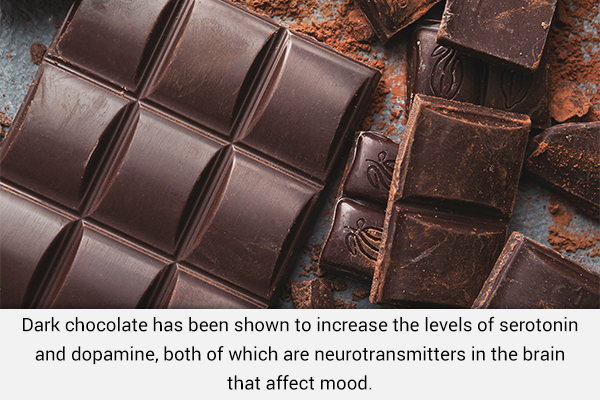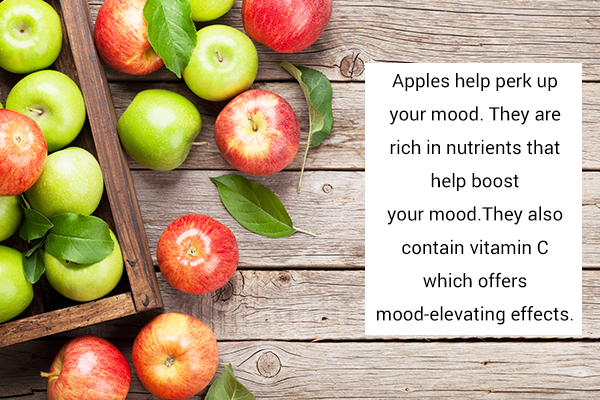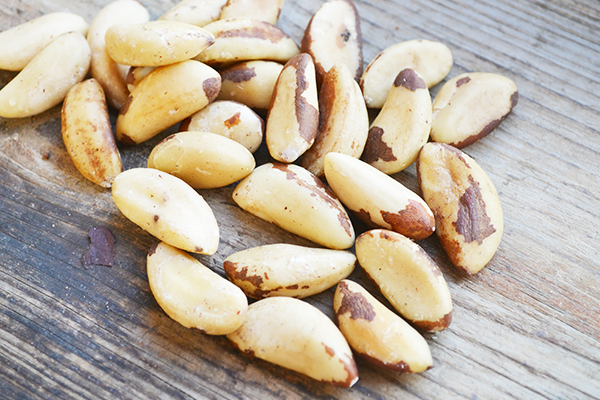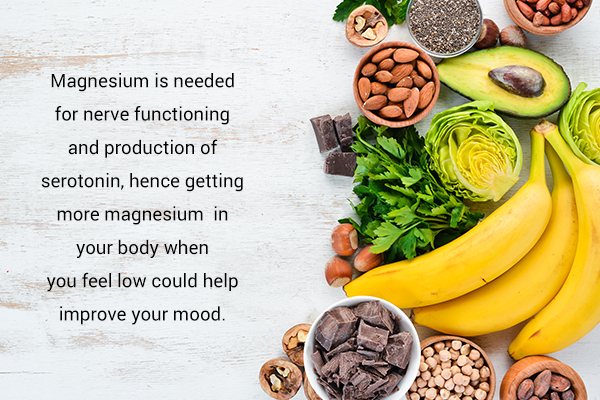Your mood is affected by a number of factors, both external and internal – it could be a sad news story, a lonely late-night thought, gloomy weather, or even an entire bad day.

And just like a positive mood can be beneficial for your overall health, a low mood can have negative impact on your physical as well emotional health. (1)
So, you see, feeling down, or having ‘the blues’ can actually make you more susceptible to illness, depression, and anxiety.
Hence, it is really important that you boost your mood in the right manner as quickly and efficiently as possible. But before you turn to medication, you may want to try any of the several natural mood boosters that can be of great help to you.
They are truly worth a try as they have been proven to be successful in helping get rid of those blues.
Fix Your Mood by These Natural Mood Boosters
Here are 10 evidence-based mood boosters available at home.
1. Indulge in some dark chocolate

Feeling down? Have some dark chocolate to lift your mood. Yes, a few bites of chocolate can make you happy – but it must be dark chocolate.
Dark chocolate has been shown to increase the levels of serotonin and dopamine, both of which are neurotransmitters in the brain that affect mood. (2)
It can also reduce the level of stress hormones, including cortisol, in people who are under stress. (3) The benefits of dark chocolate are mainly due to the antioxidants present in it.
In a 2013 study, published in the Journal of Psychopharmacology, it was found that dark chocolate had a significant impact on mood, measured by increased self-rated calmness and contentedness. (4)
A separate 2013 study, published in Nutrition Reviews analyzed several studies investigating potentially psychoactive fractions of chocolate. (5) Eight studies met the inclusion criteria for assessment of chocolate or its components on mood, of which five showed either an improvement in mood state or a lessening of negative mood.
To improve your mood, eat 1 to 1½ ounces of dark chocolate a day. But be careful, because even though dark chocolate can be beneficial to your health, it is high in calories.
2. Consume more omega-3 fatty acids

Those who often feel low should eat a diet rich in omega-3 fatty acids, which play a crucial role in emotional health.
According to Jason Way, ND, “Omega 3s are important because every cell has fatty acids, the quality of the fatty acids determine how resilient a cell is (more flexible or brittle), whether it is more prone to inflammation, if it can receive and send signals effectively and more. Nerve cells are especially high in fat and are even more sensitive to Omega 3 levels which are shown in many studies to improve symptoms and severity of depression.”
The two main types of omega-3 fatty acids – eicosapentaenoic acid (EPA) and docosahexaenoic acid (DHA) – play an important role in nerve functioning and mood regulation. These fatty acids also help restore structural integrity to brain cells that are critical in performing cognitive functions. (6)
In fact, people who get plenty of omega-3 fatty acids from their diet are less likely to experience moderate or mild symptoms of depression. (7)
A 2006 study published in the American Journal of Psychiatry reports that deficits in omega-3 fatty acids have been found in people with depressive disorders. (8) In addition, there is evidence to support omega-3 supplementation as having a role in decreasing depression. A 2016 analysis of 26 studies indicated that high-fish consumption can reduce the risk of depression. (9)
The recommended daily amount of omega-3 fatty acids for healthy adults is 250–500 mg. (10) To include more omega-3 fatty acids in your diet, you should eat more cold-water fish like salmon, tuna, sardines, and anchovies. Flaxseeds, walnuts, soybeans, and omega-3 fortified eggs are other good options. (8)
You can also opt to take an omega-3 fatty acid supplement, after consulting your doctor.
3. Switch to green tea

Enjoying a cup of green tea can help improve your mood.
Maureen Lake, Certified Integrated Holistic Health Coach and the Best-Selling Author of ‘Being Happy Raising Happy’ says, “Green tea has amino acids that provide the release of dopamine into our systems. Dopamine makes a person feel joyful or happy.
Green tea will guard your brain because it contains the amino acid L-theanine, which will trigger the release of GABA. GABA is a neurotransmitter that helps you to enter a phase of relaxation.
The extra benefit that green tea has over coffee is that it also has antioxidants and is a natural anti-inflammatory agent. Other perks? Green tea drinkers have higher bone density”.
Green tea, specifically matcha tea, a special green tea containing higher levels of phytochemicals compared to regular green tea, is frequently referred to as a mood and brain food.
Research on nutrients and phytochemicals found in green tea – L-theanine and epigallocatechin gallate (EGCG) – has repeatedly shown benefits on mood and cognitive performance. (11)
L-theanine, an amino acid found in green tea, increases dopamine concentrations in the brain. (12) It has also been shown to affect serotonin levels. (13) Both of these neurotransmitters affect mood.
So, forget the coffee and grab some green tea instead! Enjoy 2 to 4 cups of green tea daily to help lift your mood and improve your overall health as well. If you are watching your caffeine intake, it is important to know that an 8 oz. cup of green tea can have anywhere between 30 and 50 mg of caffeine. Compared to a cup of plain brewed coffee, which can contain 102–200 mg of caffeine. (14)
So you are probably better off going green.
4. Enjoy crunchy apples

Apples help perk up your mood. They are rich in nutrients that help boost your mood. (15) They also contain vitamin C which offers mood-elevating effects. (16)
Apples contain certain polyphenols, such as caffeic acid and chlorogenic acid, both of which have been shown to have antidepressant-like effects. (17)
Crispy green apples with their tart taste, in particular, help lift your mood. Being rich in fiber and complex carbohydrates, apples play a role in improving health and well-being. (18)
You can eat 1 or 2 apples daily to boost your mood as well as your overall health.
5. Enjoy sunlight

Regular exposure to sunlight is important for your physical and mental health. Sunlight aids the body’s production of vitamin D. In fact, more than 90% of the vitamin D requirement for most people comes from sunlight exposure. (19)
Low levels of vitamin D have been clinically associated with depression and cognitive decline. (20)(21) Also, a lack of exposure to sunlight is one of the leading causes of seasonal affective disorder (SAD), which is particularly common in the winter months when there are fewer hours of daylight.
With sun exposure and vitamin D, the brain is able to produce more of the mood-lifting chemical serotonin. (22) Serotonin helps lessen stress and fight off mild depression. (23) It has been suggested that combining exercise (see number 8 on our list) with sunlight may be even more beneficial in elevating your mood. (21)
You should try to get 10–30 minutes of early morning sunlight exposure several times a week. To avoid the harmful effects of too much-unprotected sun exposure, such as sunburn and risk for skin cancer, it is recommended to apply sunscreen 10 to 30 minutes before stepping out in the sun. (21)(24)
You can also opt for a vitamin D supplement, after consulting your doctor.
6. Laugh more

Laughing is one of the easiest ways to feel good and lift your mood.
Laughter not only reduces the levels of hormones like cortisol and epinephrine but also increases the levels of health-enhancing hormones. (25) A good session of laughter triggers your brain to release more endorphins, which play a key role in improving your mood. In fact, laughter can also help people suffering from either SAD or full-blown depression.
In a 2003 study, comparing the effects of exercise and humor on mood, it was noted that humor and exercise positively affected psychological distress and positive well-being equally. In addition, both humor and exercise lowered anxiety. Humor actually had a greater effect on anxiety compared to exercise. (26)
It was further suggested in an article published in 2013 that laughter helps people cope with stress, reduces depression, and improves problem-solving ability. (27) The next time you need to boost your mood, forget about everything that’s bothering you and watch a funny movie or video.
7. Eat Brazil nuts

Brazil nuts are rich in selenium which has natural mood-boosting properties. (28) In fact, low level of selenium is often linked to a poorer mood, whereas supplementation with selenium significantly decreased anxiety, depression, and fatigue. (29) This powerful antioxidant is also good for your overall health as it fights free radicals and strengthens immunity. (30)
Brazil nuts are also a good source of magnesium, which helps calm nerves, and zinc, which can help prevent depression and anxiety. (31)(32)
Enjoy a handful of Brazil nuts to lift your mood, but do not opt for salted or artificially flavored nuts. Do not eat nuts in excess, though, as they are high in calories. Additionally, selenium in excess can lead to toxicity. (30)
8. Get some exercise

Exercise is a natural mood lifter and can benefit your mental health immensely! During exercise, the brain releases endorphins, which are chemicals that promote feelings of euphoria and well-being.
According to Dr. Eugene Charles, Director of The Applied Kinesiology Center of New York, deep breathing exercises breath helps boost your mood, “Two that I have given thousands of patients is to breathe in through your nose and bring your arms up in front of you and up over your head for 12 repetitions. This gives you a dramatic burst of mood-elevating oxygen. The 2nd is to walk in place while breathing deeply through your nose and out through your mouth.”
A letter to the editor of the Primary Care Companion to the Journal of Clinical Psychiatry published in 2006 stated that exercise improves mental health by reducing anxiety, depression and negative mood as well as by improving self-esteem and cognitive function. (33)
Exercise also has been found to alleviate symptoms like low self-esteem and social withdrawal. (34) It has also been clinically proven to improve sleep in people with insomnia. (33)(35)
Aerobic exercises like jogging, swimming, cycling, walking, gardening and dancing are some good examples to give your body the boost it needs.
9. Eat more magnesium-rich foods

If you suddenly feel sad without any known cause, it can be due to a magnesium deficiency. Magnesium is needed for nerve functioning and production of serotonin, hence getting more magnesium in your body when you feel low could help improve your mood. (36)
Magnesium helps keep you feeling calm and relaxed, and its deficiency is often linked to mood problems.
A 2006 study published in Medical Hypotheses reports that magnesium deficiency is linked to depression, behavioral disturbances and irritability, and that all these problems are reversible with magnesium repletion. (37) This is further supported by a 2009 study which further demonstrated a clinically significant relationship between magnesium deficiency and depressive symptoms. (38)
Increasing your magnesium level can boost your mood and alleviate nervousness, restlessness, and general irritation. (37)(38) Some examples of magnesium-rich foods are pumpkin seeds, almonds, bananas, oatmeal, tofu, and avocados.
Taking a magnesium supplement may also be beneficial, but make sure to talk to your doctor before taking a magnesium supplement.
10. Eat saffron

Saffron, too, works as a natural mood lifter. It helps increase the levels of the neurotransmitter serotonin and acts as a natural antidepressant. A 2007 review revealed several clinical studies showing evidence of antidepressant effects of saffron. (39)
Plus, saffron has several other health benefits, including anti-inflammatory effects and improvement in blood pressure and coronary artery disease. (40) It has also been shown to help prevent neurological diseases such as Parkinson’s disease. (41)
Heat a few strands of saffron in 1 cup of milk or water. Sweeten this drink with honey and enjoy it once a day.
Final Word
The foods you eat nourish, fuel, and repair the body to keep it running at its best. Thus, your diet will inadvertently affect both your physical and mental health. But good nutrition alone cannot make much of a difference, unless it is combined with an overall healthy lifestyle.
- Was this article helpful?
- YES, THANKS!NOT REALLY



